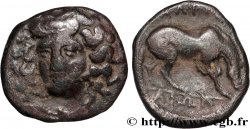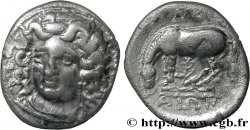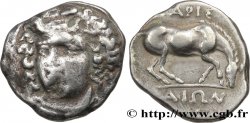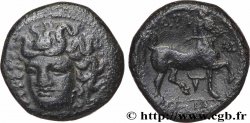v36_0118 - TESSALIA - LARISSA Drachme
MONNAIES 36 (2008)
Начальная цена : 145.00 €
Назначить цену : 300.00 €
Цена реализации : 145.00 €
Количество ставок : 1
Максимальная предлагаемая цена : 288.00 €
Начальная цена : 145.00 €
Назначить цену : 300.00 €
Цена реализации : 145.00 €
Количество ставок : 1
Максимальная предлагаемая цена : 288.00 €
Тип Drachme
Дата: c. 350 AC.
Монетный двор / Город: Larissa
Металл: silver
Диаметр: 18 mm
Ориентация осей монеты: 12 h.
Вес: 5,75 g.
Редкость: R2
Комментарии о состоянии
Exemplaire sur un flan ovale avec un très beau portrait de Larissa au droit. Revers piqué et corrodé, légèrement décentré. Une patine avec des reflets dorés orne le droit
Ссылки в каталоге: :
Происхождение:
Cet exemplaire provient de MONNAIES XXIV, n° 74
Лицевая сторона
Аверс: легенда: ANÉPIGRAPHE.
Аверс: описание: Tête de la nymphe Larissa de face tournée de trois-quarts de face à gauche, les cheveux retenus par un bandeau (l'ampyx).
Обратная сторона
Реверс: легенда: LÉGENDE PARTIELLEMENT INVERSÉE.
Реверс: Описание: Cheval à gauche, levant l'antérieur gauche, s’ébrouant.
Реверс: легенда: [LARISAIWN]
Реверс: перевод: (des Larissiens).
Комментарий
Poids léger. Cet exemplaire sur un flan étroit tout en étant relativement complet nous montre la maîtrise artistique du graveur qui a su habilement adapter son sujet à la forme circulaire du flan, tant au niveau du droit, où la chevelure vient harmonieusement occuper l’ensemble du flan et au revers, où le cheval semble se courber. La représentation du cheval à gauche est beaucoup moins courante.
Lightweight. This example on a narrow flan while being relatively complete shows us the artistic mastery of the engraver who knew how to skillfully adapt his subject to the circular shape of the flan, both on the obverse, where the hair harmoniously occupies the entire flan and on the reverse, where the horse seems to bend. The representation of the horse on the left is much less common
Lightweight. This example on a narrow flan while being relatively complete shows us the artistic mastery of the engraver who knew how to skillfully adapt his subject to the circular shape of the flan, both on the obverse, where the hair harmoniously occupies the entire flan and on the reverse, where the horse seems to bend. The representation of the horse on the left is much less common








 Cообщить об ошибке
Cообщить об ошибке Распечатать страницу
Распечатать страницу Отправить мой выбор
Отправить мой выбор Задать вопрос
Задать вопрос Consign / sell
Consign / sell
 Информация
Информация










